|
|
|
Sort Order |
|
|
|
Items / Page
|
|
|
|
|
|
|
| Srl | Item |
| 1 |
ID:
139223
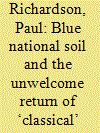

|
|
|
|
|
| Summary/Abstract |
This paper discusses how geopolitical visions from an earlier century are being reanimated in certain quarters of the political, intellectual, and military elite in the United States in order to frame recent shifts in China's status in the international system. However, these deterministic geopolitical lenses – like the historical antecedents they draw on – are misconceived and counter-productive, missing the sophistication and fluidity of world politics. It is suggested here that such reductionist geopolitical categories instead work to narrow the space for mutual understanding and deny the multiple versions of power and sovereignty in the world today.
|
|
|
|
|
|
|
|
|
|
|
|
|
|
|
|
| 2 |
ID:
139224
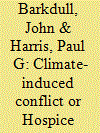

|
|
|
|
|
| Summary/Abstract |
What are the implications of global climate change for peace and human welfare in the future? The answer depends on the actual effects of climate change and how the world responds to them. Current economic and political systems are unlikely to produce the policy and institutional changes needed to reduce adequately the greenhouse gas (GHG) emissions causing the problem, so some of the most dangerous effects of climate change could occur this century. Some observers posit that climate change will result in catastrophe, but specifics of this catastrophe range widely. Does climate change mean painful but manageable social disruption, requiring, for instance, populations to move and cities to be rebuilt? Or does climate change portend much worse, including major wars, the end of modern civilization or, incredibly, even the eventual extinction of humanity? If these more severe consequences are likely or possible, what kind of global society would be best able to survive, or at least cope? The answer may be found in eco-socialism and a ‘Hospice Earth’ that nurtures people and societies regardless of how bad the future becomes.
|
|
|
|
|
|
|
|
|
|
|
|
|
|
|
|
| 3 |
ID:
139217
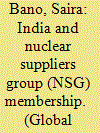

|
|
|
|
|
| Summary/Abstract |
The Nuclear Suppliers Group (NSG) was founded in 1974 in response to the Indian nuclear test in order to prevent nuclear proliferation by controlling nuclear exports. In 2008, the NSG exempted India from its full-scope safeguards (FSS) condition, making it the first country to be allowed to have nuclear trade with NSG members while retaining its nuclear weapons program. India won this waiver after tough negotiations and having resisted tough nonproliferation conditions. India is now bidding for NSG membership. This paper analyses the prospects for the membership in light of the waiver negotiations and how the waiver negotiations can guide us in assessing the likely path of the membership negotiations. This study concludes that India will resist any conditions and the US and India have to invest massive diplomatic efforts to reach a formula that addresses the nonproliferation concerns of member states.
|
|
|
|
|
|
|
|
|
|
|
|
|
|
|
|
| 4 |
ID:
139221
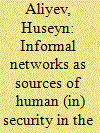

|
|
|
|
|
| Summary/Abstract |
In contrast to numerous studies on exogenous mechanisms of human security – such as the provision of human security by international actors – this study examines the role of informal networks in providing ‘freedoms from want’ and ‘freedoms from fear’ to the population. With the primary focus on post-communist South Caucasus (Armenia, Azerbaijan and Georgia) this article conducts a rigorous examination of informal networks’ critical function as sources of human (in)security since the breakup of the Soviet Union. Based on a combination of open-ended elite (expert) interviews, field observation and closed-ended survey data, this study demonstrates that apart from the informal networks’ crucial role in generating social capital and functioning as indispensable social safety nets, they also exacerbate human insecurity by cementing the traditions of clientelism and corruption that are deeply entrenched in the region.
|
|
|
|
|
|
|
|
|
|
|
|
|
|
|
|
| 5 |
ID:
139219
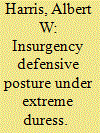

|
|
|
|
|
| Summary/Abstract |
Insurgent guerrilla groups are on occasion faced with difficult decisions: whether and when to become a conventional force, and whether to defend an operational base or fixed site. Standard doctrine suggests that to achieve state capture or acquire autonomous status apart from a central authority, the ability to successfully engage in conventional warfare may became necessary. A conventional force must be capable of defending territory, a defined space. Accompanying the decision to defend territory is a certain level of risk. This article examines the decision by four insurgent organizations to defend ‘operational hubs’, territory deemed worthy of a defense. The analysis herein submits that in insurgent warfare the utility of the territory being defended often supersedes the likelihood of a successful defense, on occasion generating negative outcomes for the insurgent forces.
|
|
|
|
|
|
|
|
|
|
|
|
|
|
|
|
| 6 |
ID:
139220
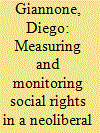

|
|
|
|
|
| Summary/Abstract |
The article aims to describe how the measurement and monitoring of human rights have been changed and weakened by the neoliberal resistance to social rights. In so doing, the study describes the political and ideological context which stimulated the broad conception of human rights included in the Universal Declaration of Human Rights. It then focuses on the ideological turn which occurred over the 1970s from welfare democracy to neoliberal democracy and the neoliberal approach to human rights. Based on a neo-Gramscian approach, the study considers political and ideological reasons as key in explaining both the rise and fall of social rights and the changes in their measurement. As a case in point, the article analyses the work of the UN in measuring and monitoring human rights. In spite of the use by the UN committees of indicators and guidelines aimed at measuring and monitoring the progressive realization of all human rights, results show that the reluctance of many states to implement social and economic rights makes UN efforts ineffective. Both states’ reluctance and instruments’ ineffectiveness can be ascribed to the neoliberal delegitimization of social rights, which is likely to persist in spite of the recent economic crisis.
|
|
|
|
|
|
|
|
|
|
|
|
|
|
|
|
| 7 |
ID:
139222
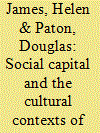

|
|
|
|
|
| Summary/Abstract |
Social capital and leadership are critical in mobilizing collective actions to promote community and individual recovery after a natural disaster. Transformation to a better situation post-disaster, not just returning to a previous state, reflects the growing emphasis on disaster as a catalyst for change. To facilitate transformative change, the development focus at the core of this approach emphasizes empowerment through local governments and domestic civil society organizations working in the ‘bottom up’ participatory mode to enhance the resilience of vulnerable population groups. Poverty reduction and disaster risk reduction are interlinked. However, the research literature on disasters pays least attention to socially created vulnerabilities. They are ignored because of the difficulty in developing agreement on theory, and prioritizing issues quantifying them. This article investigates the impact of the cultural contexts in Myanmar and Taiwan on disaster recovery and reconstruction plans for specific disaster events in which vulnerable population groups respond to different risk governance frameworks and suggests a foundation for developing a cross-cultural, all-hazards approach to understanding the relationship between resilience and recovery in the context of large-scale Asian disasters.
|
|
|
|
|
|
|
|
|
|
|
|
|
|
|
|
| 8 |
ID:
139218


|
|
|
|
|
| Summary/Abstract |
The Arab Uprisings continue to re-shape the political environment of the Middle East. As the epicentres of Egypt, Iraq and Syria draw the bulk of international attention, the impact of the last four years has been felt in more subtle ways, with a reconfiguring of alliances and relationships throughout the region. This article reviews the relationship between Saudi Arabia and the United States. There is a special focus on the challenges faced in the period of the Arab Uprisings from 2010 to 2014, with reference to the role of an ascendant Iran and the emergence of the Islamic State. Through an exploration of the three traditional pillars of the Saudi–US relationship; oil, geostrategic considerations and security, the article charts the current state of the alliance and explores the likely future trajectory of this lynchpin relationship in modern Middle Eastern affairs.
|
|
|
|
|
|
|
|
|
|
|
|
|
|
|
|
|
|
|
|
|